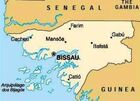Browse All Guinea Bissau Recipes: Guinea Bissau Appetizers | Guinea Bissau Soups | Guinea Bissau Salads | Guinea Bissau Vegetarian | Guinea Bissau Meat Dishes | Guinea Bissau Snacks | Guinea Bissau Desserts

|
This article is a stub! This article doesn't contain enough information. If you know anything about Guinea Bissau Cuisine, please add to this article!
|
Guinea Bissau - Cooking and Food[]
Overview of Guinea Bissau Cuisine History[]
Guinea-Bissau is positioned on the west coast of Africa and is bordered to the north by Senegal, the east and southeast by Guinea and west southwest by the Atlantic Ocean. Due to the fact that Guinea Bissau is a country that has ocean opening the most common dish is fresh fish but also fruits and vegetables. Usually, as in more or less all cultures, the cuisine of Guinea Bissau uses a combination of locally available fruits, grains, and vegetables, milk and meat products. In some parts of this country, the traditional Guinea Bissau diet has a predominance of milk, curd, and whey.
You can find rice all over the Guinea Bissau, most often imported, sometime local. It is anchored in the food habitué since the colonial days. During that period the Portuguese pressed the Guinea Bissau to produce peanuts and import the rice from Asia. Cuisine of this exotic place reflects indigenous traditions, as well as influences from Arabs, Europeans, and Asians.
Cuisines of Guinea Bissau[]

Map of Guinea Bissau- Click to enlarge
A typical Guinea-Bissau meal is concentrated with starchy substance, light on meat and generous on fat. Fufu, a semi-solid starchy mass alike to mashed potatoes or polenta, is served with soups and stews, such as egusi. Fufu is frequently made from starchy root vegetables such as yams, coco yams, or cassava, but as well from cereal grains or plantains.
Another characteristic of Guinness cuisine is the hot spices, including peppers and chiles. Seeds of Guinea pepper, Aframomum melegueta which are also called grains of paradise are a native West African plant, which is used to prepare traditional sauces. In real meaning, the local cuisine and recipes of Guinea Bissau continue to remain intensely ingrained in the local society and traditions, with ingredients like rice, peanuts, Bambara Groundnut and Hausa Groundnut, black-eyed peas, and root vegetables such as yams, coco yams, sweet potatoes, and cassava. Guinea Bissau cuisine also includes Pork meat and fish. cereals are making a strong entrance and are consumed in the morning or evening. The dishes basic ingredient is the couscous de mil which means couscous of millet because it represents a village tradition.
Preparation Methods for Guinea Bissau Cooking[]
Cooking techniques of Guinea Bissau often combine fish and meat, counting dried fish. Flaked and dried fish is often fried in oil, and sometimes cooked with Chicken, yam, onions, various spices and water to prepare a highly flavored stew. In some areas, Beef, and mutton are not preferred due to poor quality of the meat, particularly toughness. It is common to have a preponderance of seafood and the seafood, as earlier stated, is sometimes also mixed with other meat products. Eggs and chickens are also preferred. Guinness cuisine uses elements from various cooking traditions borrowed from their neighbors and developed from their own traditional dishes, like Portuguese or French. Using the right amount of spices for example is essential for spicing up the taste or for coloring the dish. Each traditional dish has a special cooking method, which is more or less general in all of Guinea Bissau regions.
Special Equipment for Guinea Bissau Cooking[]
In Guinea Bissau cuisine exists a great variety cooking equipments from cake pans, can openers, colanders, egg rings, poachers and holders, food dishes and portioned, food pans and food containers to other kitchen utensils, such as food scales, food scoops and fryer baskets and accessories. The Guinness cuisine requests various food preparation equipment set in order to produce the most refined Guinness dishes. You should consider insulated food carriers if you are transporting the food and a full set of kitchen linens and uniforms if you wish to look like a pro. Here are a few other items that will come handy while cooking Guinness food: juicers, kitchen knives, kitchen slickers, and kitchen thermometers, measuring cups and measuring spoons, miscellaneous utensils, mixing bowls and skimmers and strainers. Necessary utensils like serving spoons, spatulas, forks, turners, scrapers and tongs should as well be part of your cooking "munitions store”. When the entree is served, small plates or bowls are also brought in from which the host or hostess dishes out portions of salad and gives each guest a spoon with which to eat the salad.
Guinea Bissau Food Traditions and Festivals[]
Like in many others countries here are many public festivals and holidays where the inhabitants eat special foods and have special parties. One of the most important festivals is National Day on September 12 which means Amilcar Cabral's birthday, when peoples eat yassa, which is a version of Chicken. The pieces of Chicken, brushed with mustard, marinade in some citron, and cooked with lots of Onion are often served at this festival. Other important festivals are Colonization Martyr's Day, August third, Readjustment Movement Day at November, Independence Day, September twenty four, Mocidade Day, December first and New Year Day.
People in Guinea Bissau Food[]
- Are you into Guinea Bissau Cooking and would like to be interviewed?
The Guinness kitchen is usually outside or in a divided building apart from the sleeping and living rooms. There are many chefs who creatively use the essential ingredients and cooking process for traditional Guinness dishes and make innovative and tasty food variations. Guinness chefs are passionate about their traditional dishes and they enjoy presenting them to foreigners who has never tasted them before. Whether they are cooking dishes that go back in time for centuries or brand new, modern dishes, Guinness chefs take pride in what they do, and this is readily noticeable in the unforgettable taste of their cooking.
The vessel usually sits on three stones set in a triangle, and the fire slowly consumes three pieces of wood that meet at a point under the pot.
